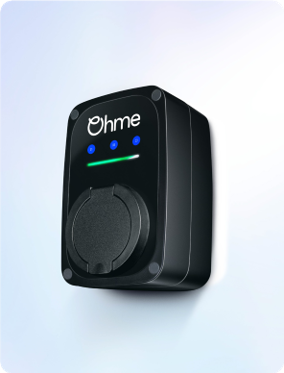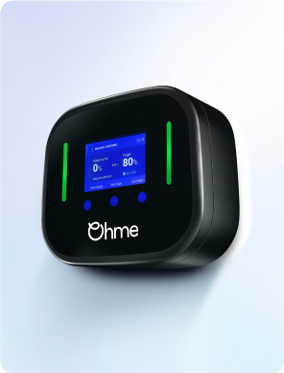Our smart chargers are a green and easy way to charge that reduce the cost of owning an EV. You can rely on your car being charged and ready to go when you are.
We're the only EV charging provider to integrate with all energy tariffs, including Intelligent Octopus and OVO Charge Anytime, the next generation smart EV charging tariffs.
All our chargers are compliant with the UK New Smart Charger Regulations for complete peace of mind.
The all-new Ohme ePod is suitable for all types of electric vehicles featuring Ohme’s class leading smart charging technology. Its compact design makes it an ideal discreet charger for all homes.
From £925* (inc. VAT standard install)

The Ohme Home Pro is our premium charger, perfect for powering your car at home the easy way. Simply control your charging sessions via
its colour screen or on the Ohme smartphone app
From £975* (inc. VAT standard install)

A home charger is a compact unit designed to let the everyday EV driver power their electric car from the comfort of their sofa. Charging at home is cheaper and quicker, and saves you a trip to a public destination to top up your car. It's simple: plug-in when you get home and wake up to a fully charged battery.
Smart charging refers to a charging system that optimises charging through data connections. Our smart chargers communicate with your car, our servers, and the National Grid. Through this communication, smart chargers can optimise your charging and maximise your savings. Our smart chargers can stop and start charging to align with periods of low demand on the grid, when prices are generally lower. This not only saves you money but also helps balance the grid.
If you have a time-of-use tariff or a variable tariff, you’ll pay less for your electricity at certain times of the day. The Ohme app uses your tariff information to charge as much as possible when the price is low to maximise your savings.
Greener:The Ohme server communicates with the grid which allows you to charge when carbon intensity is at its lowest. Just make sure you enable the 'favour greener energy' feature in 'settings'.
Remote management:The Ohme charger can adjust energy intake according to peaks and lows in electricity demand which allows for load balancing and peak shaving. Put simply, peak shaving refers to managing consumer demand to eliminate demand spikes (high peaks) which in turn puts less pressure on the grid. This is often done through energy suppliers offering cheaper electricity during off-peak hours.
There are a number of things that can affect how long it takes to fully charge your EV. The charge point directly affects the rate at which your car charges as it will have a maximum charge rate it can deliver. The time it takes to charge is also affected by car battery size, battery state of charge, and environment (such as how cold it is outside). This might all be new to you, but we'll explain a little bit more about how these factors impact how long it takes to fill your battery.
Battery Size:Some cars have larger batteries than others, and these will take longer to fully charge. If you have a plug-in hybrid with a smaller battery, you'll notice this take much less time to full charge than a fully electric car.
Maximum charge rate of vehicle:Your EV will have a maximum charge rate which effects how quickly the battery can accept charge. If your car has a maximum charge rate of 7kWh, this means it'll only be able to consume 7 kilowatts of energy every hour. You can use your car’s maximum charge rate and battery size to work out how long it may take to fully charge.
Maximum charge rate of charge point:Each charge point has a maximum charge rate, which may differ from the max charge rate of your car. Your car may have a maxi- mum charge rate of 7kWh, but you'll notice the car charges much more slowly when plugged into a 3-pin charger with a max charge rate of 2.4kWh.
Temperature:Colder temperatures can cause longer charging times, but you'll probably only notice this when rapid charging. A cold battery will take a li le longer to ramp up to 200kWh, but shouldn’t have any trouble charging at 7kWh in colder weather.
State of battery:The closer your battery is to empty, the longer it will take to charge. Make sure you allow plenty of time to charge if your battery is particularly low.
